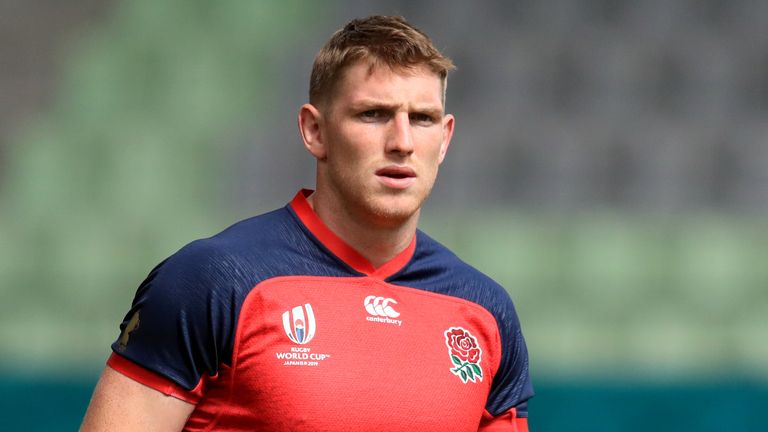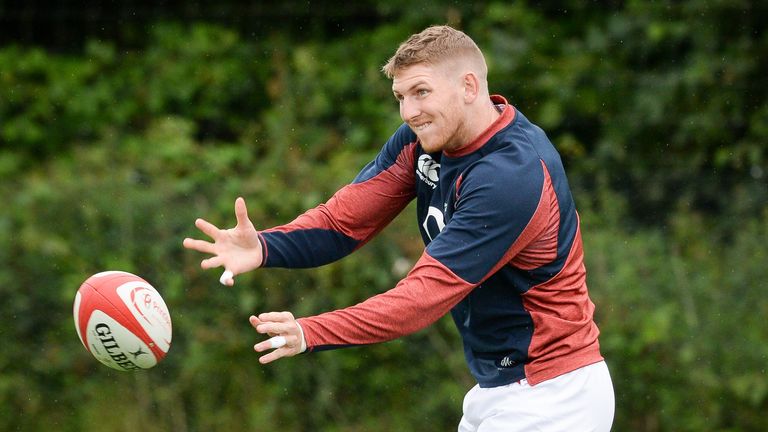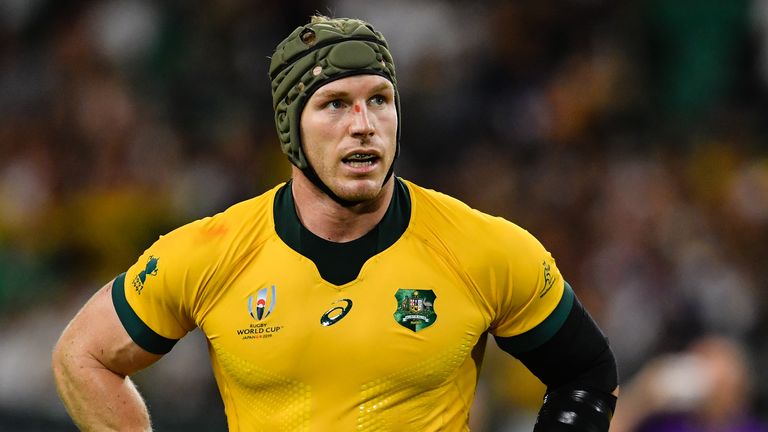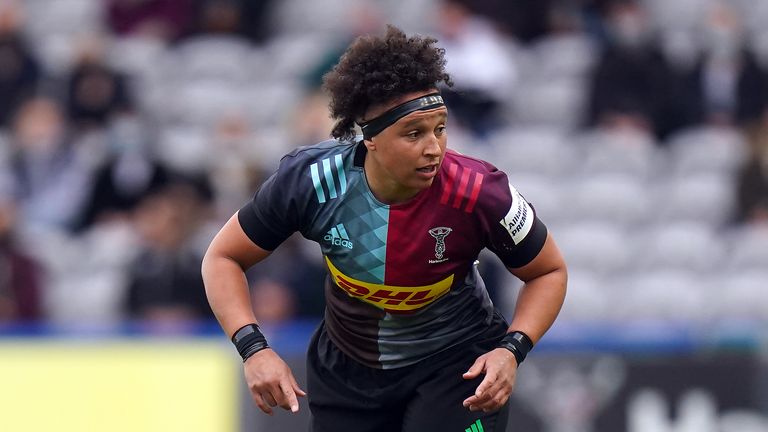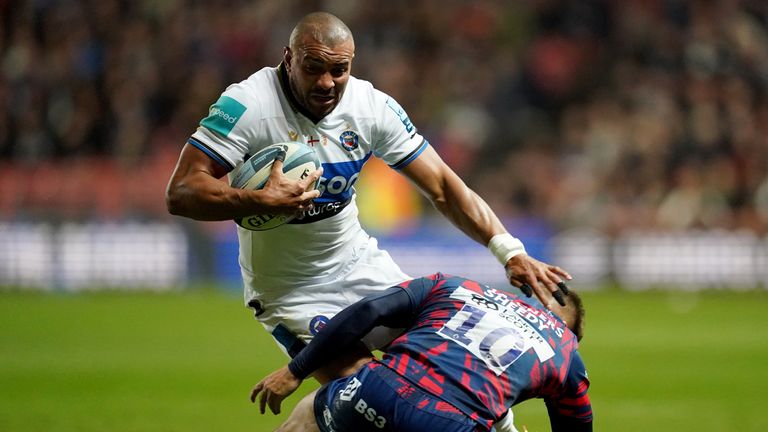Ruaridh McConnochie joins hundreds of others in signing letter to World Rugby on climate change
Ruaridh McConnochie has joined more than 200 other current and former rugby players in signing a letter sent to World Rugby calling on them to show leadership in tackling climate change
Monday 22 November 2021 11:44, UK
Bath wing Ruaridh McConnochie tells Sky Sports News' David Garrido why he has joined hundreds of other rugby stars, past and present, in imploring World Rugby to lead the way in tackling climate change.
If you are an elite athlete and you have been unlucky enough to witness first-hand the effects of climate change, yes, you are probably in a small number. But the sad and indisputable fact is that that number is increasing.
Wing Ruaridh McConnochie was part of the England squad which had its group game with France called off at the 2019 Rugby World Cup, as Typhoon Hagibis ripped through Japan and disrupted the tournament, forcing three games to be cancelled.
"We had to fly pretty much overnight from Tokyo to get out down to the southern island of Japan, to basically stay safe but also so that we could keep training," he recalls.
More alarming for McConnochie is what has been happening more widely across the planet, the irrefutable evidence that extreme weather is a direct product of the climate emergency.
"You see the fires across Australia, across America," he says. "It's absolutely devastating and it's destroying whole communities."
- The future of sport is net zero carbon
- England shade Springboks in thriller
- Eddie Jones hails England 'rebirth' vs SA
But the 30-year-old is not alone in feeling that something urgently needs to be done, and, in fact, he is in pretty good company.
McConnochie and more than 200 other current and former rugby players have signed a letter sent to World Rugby and the sport's national governing bodies, calling on them to "safeguard a better world" and to show leadership in tackling climate change, ahead of their next council meeting on Wednesday.
The other names include the likes of McConnochie's Bath and England team-mate Jonathan Joseph, Australian Rugby World Cup finalist David Pocock and England forward Shaunagh Brown, who has won two Six Nations Championship titles.
"Strength. Courage. Selflessness. These qualities bind us together as athletes and lovers of the game. And we'll need every one of them if we're going to meet the threat that climate change poses," states the letter.
And selflessness is a particularly important characteristic when it comes to one of the more uncomfortable issues discussed again at COP26, the UN climate change conference held in Glasgow earlier this month: the poorest nations are often the lowest contributors but the worst hit by this critical problem, and they desperately need help from developed countries.
Rugby has its own version of that, and it is an acute case, according to McConnochie.
"You look at the Pacific Islander players, they make up 25 per cent of the professional rugby population, yet a lot of these countries - Tonga, Samoa, Fiji - have some of the biggest increases in sea levels across the globe, and they're most at risk," he says.
"So not only is our sport as rugby affected from it, but them as individuals, their families, their livelihoods…they're all affected even worse."
The letter sent to World Rugby states that: "Ours is a sport of comebacks, sometimes against all the odds. It's a game of strategy and tactics, paired with courage and ambition. And it creates an unparalleled camaraderie within teams."
And in fact, that camaraderie is what helped the Bath wing start his sustainability journey in the first place, when he was playing sevens, a sport in which he won Olympic silver in 2016 and Commonwealth bronze in 2018.
"When I was in the England Sevens, we were a unique group. It was a very caring group and it kind of opened my eyes to it," McConnochie says.
"Definitely the people that were leading the way were the likes of Dan Bibby and Tom Mitchell, trying to raise awareness through something as small as bringing a reusable coffee cup for everyone in the team."
The irony is that sevens rugby was one of those sports whose athletes faced the gruelling challenge of playing in the hottest Olympics on record in Tokyo this summer.
McConnochie adds: "That's crazy - with the endurance-based sport that there is, like sevens on its own, but you've got the marathon…are they going to have to completely change when the Olympics takes place, or the timings of events so you're looking at overnight marathons or overnight long-distance running?"
It is a stark possibility, really not that fanciful an idea at all, and a frightening one at that - not that McConnochie lets that overwhelm him or stop him taking his own climate action steps.
"I still strive to do better and better each day, whether it's trying to promote more reusable bottles, and Bath have now switched around, so they're trying to get rid of all the plastic bottles that they use, and just use reusable," he says
However, McConnochie also concedes that more needs to be done, such as putting pressure on big organisations.
And when it comes to translating promises into proper action, surely that is the way it needs to be, hence this letter to World Rugby - imposing something from the top down always makes it more likely to happen.
It is not a coincidence that Ecotricity founder Dale Vince is chair of Forest Green Rovers, and that they are the greenest football club in the world.
Whether World Rugby and the NGBs do seize this opportunity to take a leading role in the issue at the upcoming council meeting remains to be seen.
They have already signed up to the UN's Sports for Climate Action Framework, so that is a first step, one of 273 signatories at present, but less than a fifth of those have committed to a second phase, which requires agreeing to specific targets: halving greenhouse gas emissions by 2030 and reaching net zero by 2040.
Nevertheless, the athletes have spoken, and their voices are growing louder.
